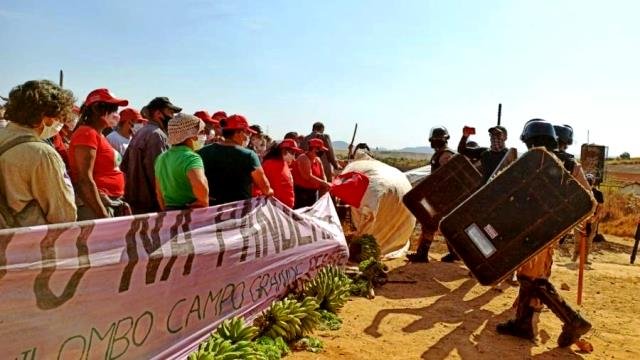Public Note #24 – On the eviction of Quilombo Campo Grande
17 Aug 2020, 17:17
The Dom Paulo Evaristo Arns Commission for the Defense of Human Rights – the Arns Commission – goes public to denounce and raise its voice of indignation against the violence that affected nearly 450 families in Quilombo Campo Grande, in the state of Minas Gerais. This is a community of more than 2,000 people who have been using the area for 23 years for agroecological production and housing, thus fulfilling the social function of property on the land of an old mill whose company went bankrupt.
Since last Wednesday, August 12, this community has been the target of a questionable order of land repossession carried out by 250 soldiers of the Military Police, amidst the most acute phase of a pandemic that imposes social distancing as a way to protect the lives of all.
The governor of Minas Gerais, Romeu Zema, had already announced the suspension of the eviction, giving in to requests for dialogue and intermediation that were presented by religious authorities, artists, civil society entities, as well as by institutions such as the National Human Rights Council (Conselho Nacional de Direitos Humanos – CNDH, in Portuguese), the State Public Defender's Office, and the Human Rights Commission of the Chamber of Deputies, which, in this case, constituted a front of parliamentary support for the eviction’s suspension.
Despite the negotiations, the governor's word was broken and an eviction operation continued to be carried out, with situations of intimidation, low-flying helicopters, demolition of a school by tractors, and destruction of crops and agricultural products. Fire was set in the dry pasture in order to curb the peaceful resistance of the residents, tear gas and pepper bombs were thrown, families were evacuated, and at least four people who resisted the attacks were arrested while protecting their families and, in particular, their children.
The Arns Commission's repudiation of this type of serious violation of human rights becomes even more pressing when one takes into account the current catastrophic pandemic scenario in our country, in which the state of Minas Gerais has been showing an alarming increase in the contamination curve and number of deaths by COVID-19 in recent days.
A year ago, the Arns Commission sent a joint message to these families and to the magistrates of the Court of Justice of Minas Gerais, urging the authorities to decide with high sensitivity given the social issues involved, since, with an apparent conflict between fundamental rights, i.e. the right to property and the right to housing, they must decide with caution and responsibility, using the legal means of mediation and conciliation for the benefit of the life and work of that community. Thus, the Court of Justice (Tribunal de Justiça – TJ, in Portuguese) overturned the 1st-degree eviction order.
Now, in 2020, when federal and state decrees, laws, and judicial decisions converge in the recognition of a state of public calamity due to a health and humanitarian crisis that has already claimed 100,000 Brazilian lives, this same sensitivity needs to be reiterated and confirmed – never abandoned. The upsurge of violence, by putting more lives at risk, is not in the interests of democracy and human rights.
Therefore, the Arns Commission:
Recommends that public, judicial, and executive authorities suspend any action, whether the result of a private or public initiative, or supported by a judicial or administrative decision, which has the purpose of evicting families and communities during the pandemic period, in order to respect the social distancing, hygiene, and social assistance measures that are essential to contain the advance of COVID-19.
Recommends that public authorities take into account the advancements and experiences achieved and accumulated regarding this type of conflict, in particular Recommendation No. 10 of the National Human Rights Council, from October 17, 2018, which establishes solutions that safeguard human rights and preventive measures in situations of collective, rural, and urban land conflicts, by putting them into practice in this situation;
The Arns Commission also expresses its optimistic expectation regarding the superior courts of Brasilia, so that they decide, with the utmost urgency, on the definitive suspension of the eviction, including based on an instrument already filed by the former president of the Federal Council of the Brazilian Bar Association (Ordem dos Advogados do Brasil – OAB, in Portuguese), Cezar Brito.
It invites the press to devote due attention to the ongoing episodes, as they concern the realization of human rights in the face of inequalities and income concentration, both in the rural and urban areas.
Photo: MST